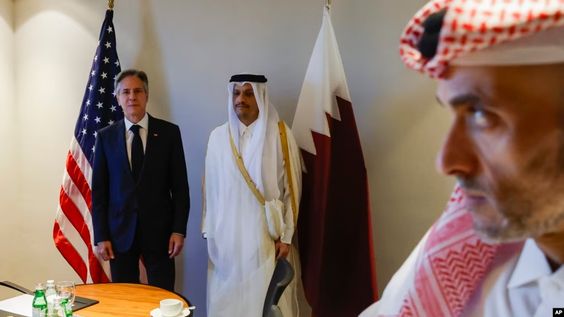Headlines
Blinken visits Jordan to discuss the Israel-Hamas conflict and the humanitarian crisis in Gaza

After travelling to Israel to hold meetings over the Israel-Hamas conflict, U.S. Secretary of State Antony Blinken is currently in Amman, Jordan.
Blinken has been holding meetings in Amman with representatives of Jordan, the secretary-general of the Palestine Liberation Organization’s executive committee, and the foreign ministers of Saudi Arabia, the United Arab Emirates, Egypt, and Qatar.
They have been gathering to devise strategies for ending both the Israeli-Hamas conflict and the humanitarian disaster in Gaza.
On Saturday, Blinken also had a meeting with Najib Mikati, the acting prime minister of Lebanon.
Ayman Safadi, the foreign minister of Jordan, declared in a statement before to Blinken’s visit that Israel needed to stop its war on Gaza, claiming that by bombing civilians and enforcing a siege, it is engaging in war crimes.
Following his meeting with Israeli Prime Minister Benjamin Netanyahu and the war cabinet on Friday in Tel Aviv, Blinken declared that stopping the escalation and spread of the nearly month-long Israel-Hamas conflict was of utmost importance.
Following the discussion, Blinken gave reporters a rundown of the actions he believed were necessary to guarantee both a “better tomorrow” for the people of Israel and the Palestinians as well as the prevention of another attack similar to the one carried out by Hamas on October 7.
We have made it very evident that Israel’s approach to defeating Hamas matters. It matters because doing so is both morally and legally acceptable. It matters because, as Blinken noted, not doing so gives Hamas and other terror organisations the upper hand.
“There will be no partners for peace if they’re consumed by humanitarian catastrophe and alienated by any perceived indifference to their plight,” he stated.
READ ALSO: Blinken asks for humanitarian halt; Netanyahu responds that only if hostages are released
Blinken stated that the United States supports Israel’s “right and obligation” to defend itself, but he also urged Israel to cease hostilities and permit additional humanitarian supplies to reach Gaza. He stated that his second top goal on this tour is to protect Palestinian citizens.
In response, Netanyahu stated, “We’re continuing with all our force, and Israel is refusing a temporary truce that doesn’t include the release of our hostages.” In its attack, the U.S.-designated terror group Hamas killed 1,400 people and abducted 230 hostages.
In retaliation for the terror act by Hamas, Israeli airstrikes have rendered hundreds of thousands of Palestinians homeless. The UN said that more than 9,250 people have died in the enclave, according to the health ministry operated by Hamas on Friday.
According to Blinken, even though 100 trucks per day are currently passing through the Rafah border crossing from Egypt, it is still insufficient. He stated that increasing funding “substantially and immediately” to Gaza is necessary and that his third goal is to remove American citizens and other foreign nationals from the region. According to him, Israel made a commitment to allow for more help to enter the region.
Hassan Nasrallah, the leader of Hezbollah in Lebanon, gave a speech on Friday, and Blinken was questioned about it.
In addition to denying any role in the strike on Israel on October 7, Nasrallah said that Hezbollah had already entered the conflict due to their weeks-long barrage of artillery and rocket fire with Israel.
“With regard to Lebanon, with regard to Hezbollah, with regard to Iran,” Blinken stated, “we have been very clear from the outset that we are determined that there not be a second or third front opened in this conflict.” In an interview with Israeli media, Blinken mentioned that the US had sent two aircraft carrier battle groups to the area to prevent the fighting from getting worse.
Blinken’s visit takes place in the midst of broader diplomatic efforts to end the Israeli-Hamas conflict and allow more humanitarian relief to reach Gaza, with Israeli ground forces having surrounded Gaza City.
A humanitarian crisis in Gaza is being threatened by the UN and other relief organisations unless more supplies is permitted to reach the region. Not long after the Hamas attack, Israel completely closed off Gaza. In Gaza, where there are about 2.3 million inhabitants, this combined with the constant bombardment has resulted in a lack of fuel, clean water, and food.
In the meanwhile, a directive from U.S. Defence Secretary Lloyd Austin restricts the number of top military officers who can visit Israel and pauses military support for congressional travel there.
Speaking to VOA on condition of anonymity, a senior defence official stated that more travel in a volatile battle zone would put “unnecessary risk and undue burden on our forces.”
In additional revelations Israel started returning thousands of Palestinian labourers who had been left stranded in Israel after the Hamas onslaught to Gaza on Friday.
Meanwhile, it was anticipated that more foreign people who had been stranded in Gaza since the beginning of the conflict will cross into Egypt at the Rafah border crossing.
On Wednesday and Thursday, hundreds of foreigners as well as dozens of Palestinians with critical injuries evacuated Gaza via Rafah.
Reopening the Rafah border crossing to permit exit for holders of foreign passports was a component of an agreement between Israel, Egypt, and Hamas mediated by Qatar.
This article was contributed to by VOA U.N. Correspondent Margaret Besheer and Senior State Department Correspondent Cindy Saine. Additionally, Reuters, Agence France-Presse, and The Associated Press provided some information.
